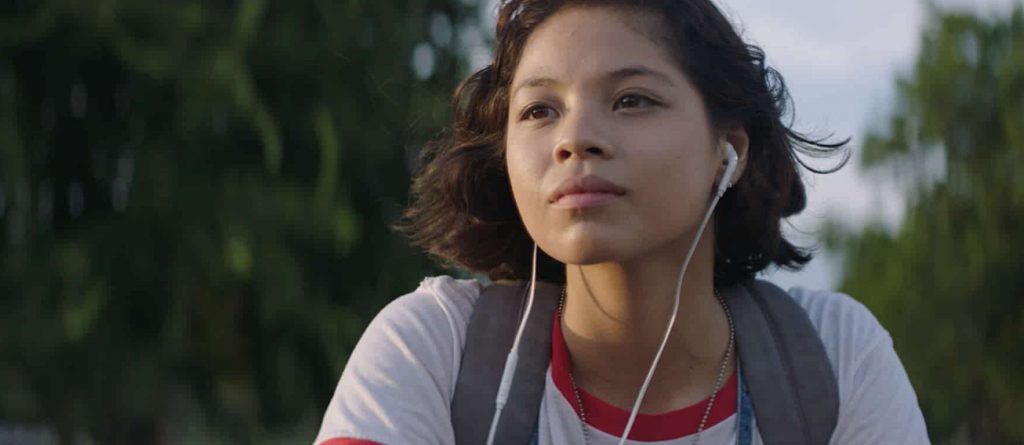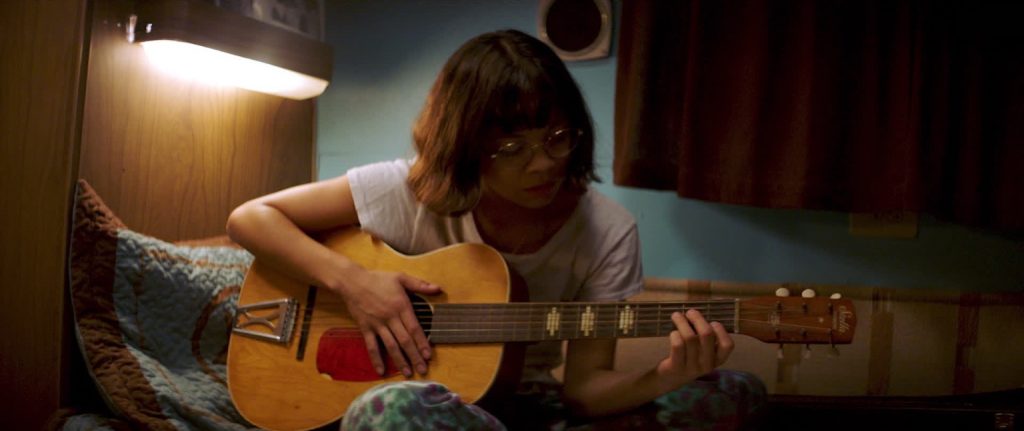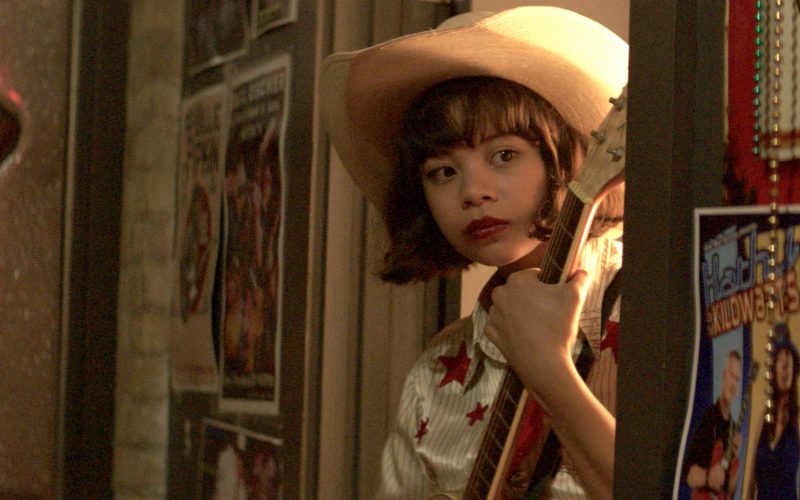Yellow Rose (2019).
Directed and co-written by Diane Paragas, Yellow Rose stars Eva Noblezada as Rose Garcia, a young Filipino woman living in Texas. Unbeknownst to Rose, she and her mother have been living in the United States without documentation. One day, while Rose and her friend Elliot (who is not quite her boyfriend) are visiting a country and western dance hall in Austin called The Broken Spoke, the immigration police arrive and arrest Rose’s mother. With nowhere to go, Rose returns to The Broken Spoke and befriends the live-in star performer, Dale Watson, who encourages Rose to realise her dream of becoming a country and western singer-songwriter.
Yellow Rose is a film about the two different Americas that we’re always hearing about. There’s the one which promises a better life for its inhabitants – a life that allows freedom of expression and the opportunity to pursue one’s dreams. This is an America that has made uncountable contributions to popular culture, open for all to enjoy and aspire to take part in. In this America, Rose, an Asian woman, has no trouble being embraced by her fellow lovers of country and western music. But crouching menacingly beneath all of this is the other America with its strict and callously applied immigration laws that separate human beings from the lives they’ve created, and mothers and fathers from their children.

Yellow Rose does not go deep into the arguments for and against seemingly harsh immigration policies. Instead it simply shows the human cost of such actions. The film focuses on the shocking suddenness of Rose’s mother’s arrest and removal, the de-humanising conditions she then lives under while awaiting deportation, as well as the dangerous situation that her daughter has now been left in. The immigration officials involved in Rose’s mother’s arrest and containment are largely left at the periphery of the story. Hints of bullying and humanity are shown, but the film isn’t about them. It’s about the shattering effect of the rules that they rigidly uphold. As such, Yellow Rose makes a powerful point that by-passes politics. Whatever your standing may be on immigration, there is no doubting the heart-breaking human cost of suddenly removing someone from home and family. The film puts this across with potent force, without ever becoming overwrought.
Although the subject matter may be weighty, Diane Paragas’s film is in large part a charming, light-hearted affair, that is as much a coming of age tale as it is a tale of separation and distress. Freed of her mother’s well-meaning, but overbearing influence, Rose is now able to pursue her love of country and western music, and under the mentorship of country singer Dale Watson, playing a version of himself, she flourishes. These scenes play like a gentler, paternalistic version of A Star is Born, minus the tragedy, and are among the best in the film. The songs performed in the film, which are composed by Watson, Noblezada, and Paragas, among others, are a delight, with pleasing melodies and catchy lyrics that relate well to the story. Aesthetically the film is equally light of touch, unfussy with lots of handheld shots which come together to give Yellow Rose a feeling of movement and realism.

The performances are all excellent, though one must single out Eva Noblezada, making her screen debut as Rose, who is in every scene, and carries the film with her engaging screen presence and her unaffected acting, as well as her lovely singing voice. I had the great pleasure of seeing Noblezada perform her break-out lead performance in Miss Saigon in London’s West End several years ago – and was left mesmerised by her talent at the time – so her ability to beautifully carry a tune is hardly a surprise. However, Yellow Rose is not, strictly speaking, a musical, but a drama with a sprinkling of songs. Therefore it is Noblezada’s acting chops that are given the biggest workout in a deceptively complex role and she manages to convey Rose’s innocence and fear, as well as her optimism and thirst for new experiences with a quiet, seemingly effortless naturalism. There are many emotionally fraught scenes within the film and Noblezada handles each one of these convincingly, reaching just the right pitch, staying balanced between loss and strength and staying away from heart-tugging histrionics. As debuts go, Yellow Rose must have been a significant challenge for Noblezada and she impresses throughout.
Mention must also go to Princess Punzalan, as Rose’s mother, Priscilla, who delivers a performance that subtly conveys both dignity and a mounting sense of desperation as she loses her home and her influence over her daughter. High praise too must go to Dale Watson as Rose’s country and western mentor, who comes across as a blend of Elvis Presley and Johnny Cash and who manages to seem wise, caring, yet world-weary and damaged. He’s a charming and warm presence in the film. Also in the film is Lea Salonga, who is perhaps best known for singing the roles of Princess Jasmine and Mulan in the original animated Disney classics, and who this author has also seen live at the London Palladium during her recent world tour. Salonga plays Rose’s aunt, an American citizen with a child and an American husband. Salonga is only in the film for a short time, but makes her mark nonetheless with a performance that suggests the steely-strength and sacrifice that it takes to make it in a foreign country, and the regret that she can’t help her undocumented niece. Now if only she’d been given the opportunity to unleash her incredible singing voice.

Yellow Rose is an unassuming film that has a welcome feeling of authenticity about it. It’s a film with plenty to say about the immigrant experience, but it does so without anger, instead opting to weigh up the potential cost of living in a foreign land against the many freedoms and opportunities that might bring. However, more than anything, it’s a coming of age story about a talented girl who just wants to sing, and needs a little space and a little nudge.
Film ’89 Verdict – 8/10
Yellow Rose is available now on Blu-Ray, Digital and On-Demand.

